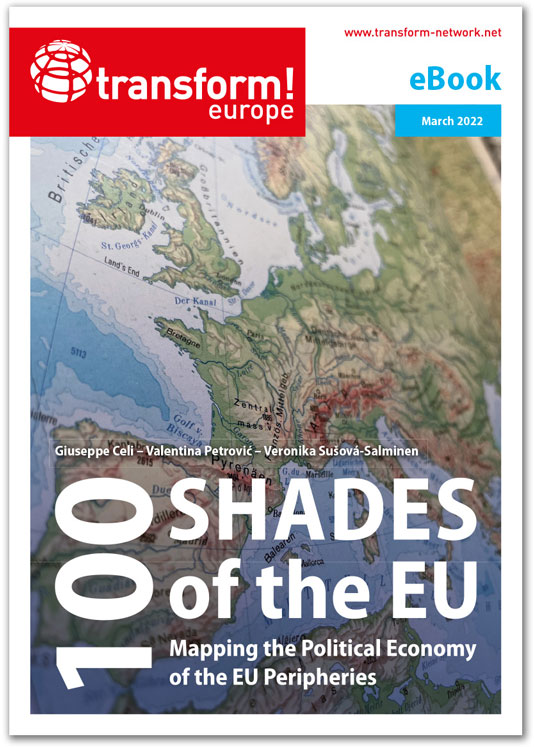We cordially invite you to submit your panel proposals for the conference “100 Shades of the EU: The Political Economy of the EU Peripheries Between Pandemic and War” organised by transform! europe in cooperation with Rosa-Luxemburg-Stiftung focusing on political economy of the EU seen from the peripheral perspective.
transform! europe, in cooperation with Rosa-Luxemburg-Stiftung, organised the comparative study “100 Shades of the European Union: Mapping the Political Economy of the EU Peripheries”. The study was published in June 2022 and focuses on the Southern and Eastern peripheries of the EU, their economies and economic position in the EU, the links between the European integration process and emerging/existing economic models in both peripheral regions, their economic, trade and political interactions with the core (Western European countries, esp. Germany), and dependencies related to them as well as political and cultural/ideological aspects of the peripheral position in the EU. The aims of the study were, among others, to understand the current forms and manifestations of power asymmetries and dependencies in the EU as a platform for discussing alternatives to the current state of the EU, to promote self-representation of EU peripheries (East by the East and South by the South), and to build bridges and cooperation strategies between these EU regions.
In April 2023 transform! europe in cooperation with Rosa-Luxemburg-Stiftung organises the conference “100 Shades of the EU: The Political Economy of the EU Peripheries between Pandemic and War” aiming at expanding the academic and political discussion about the political economy of the EU seen from the peripheral perspective.
For this purpose, we welcome abstract proposals addressing the following topics:
- Core and periphery model and the EU
- Structures of dependency in the EU
- Economic and political impacts of the Covid-19 and the war on Ukraine on the EU, particularly on Southern and Eastern peripheries
- Position of Labour and Trade Unions
- International cooperation between workers in different countries involved in GVCs
- Political cleavages in the EU
- The role of EU and the role of the State in shaping Europe
- A new industrial policy for Europe
- Social and Cultural constructions of peripherality in the EU
Conditions
To participate in the conference, we kindly ask you to submit:
- the title of contribution
- abstract (max. 200 words)
- short CV, contact details and institution affiliation (if eligible)
by email to Tatiana MOUTINHO at moutinho[at]transform-network.net, putting in subject “APPLICATION: 100 Shades of the EU Conference 2023”.
Any questions can be sent by email to the same address.
Timeline and guidelines
| Conference date: | 3-4 April 2023 (2 days, public event) |
| Conference venue: | Trieste (IT) |
| Language: | English |
| Application deadline: | 15 February 2023 |
| Notification of acceptance of the contribution: | 28 February 2023 |
Fee
A fee of 40€ shall be charged but exemption may be acceptable upon request.
Scientific team
Giuseppe Celi – Giuseppe Celi is currently Associate Professor of Economics at the University of Foggia (Italy). His research interests focus on subjects related to international economics. Among other works, he wrote Crisis in the European Monetary Union. A Core-Periphery Perspective, Routledge (co-authors: Andrea Ginzburg, Dario Guarascio and Annamaria Simonazzi).
Valentina Petrović – Valentina Petrović is currently a postdoctoral researcher in the Department of Sociology at the University of Zurich. Her research interests include democratization, Europeanization, political mobilisation and comparative political economy in the post-communist context.
Veronika Sušová-Salminen – Veronika Sušová-Salminen is a comparative historian and political analyst specialising in modern Central and Eastern Europe, including Russia, with a methodological focus on world-system analysis and dependency with some influences from postcolonial studies.
